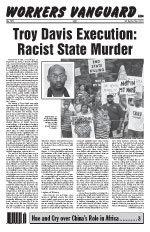
Labor Struggles and the Capitalist State (Quote of the Week) In fighting company union-busting, longshoremen in Longview, Washington, are confronting anti-labor laws enforced by government agencies, the courts and the police. Drawing some lessons of the successful 1934 Minneapolis Teamsters strike, Trotskyist leader James P. Cannon pointed out that many workers were learning from their own experience that the state was not neutral but was an agency of the capitalist class in suppressing labor struggles. He also explained that strike strategy and tactics must be guided by a realistic assessment of the actual balance of class forces in the concrete situation. This spirit of determined struggle was combined at the same time with a realistic appraisal of the relation of forces and the limited objectives of the fight. Without this all the preparations and all the militancy of the strikers might well have been wasted and brought the reaction of a crushing defeat. The strike was understood to be a preliminary, partial struggle with the objective of establishing the union and compelling the bosses to “recognize” it. When they got that they stopped and called it a day. The strong union that has emerged from the strike will be able to fight again and to protect its membership in the meantime. The accomplishment is modest enough. But if we want to play an effective part in the labor movement we must not allow ourselves to forget that the American working class is just beginning to move on the path of the class struggle and, in its great majority, stands yet before the first task of establishing stable unions. Those who understand the task of the day and accomplish it prepare the future. The others merely chatter. As in every strike of any consequence, the workers involved in the Minneapolis struggle also had an opportunity to see the government at work and to learn some practical lessons as to its real function. The police force of the city, under the direction of the Republican mayor, supplemented by a horde of “special deputies,” were lined up solidly on the side of the bosses. The police and deputies did their best to protect the strikebreakers and keep some trucks moving, although their best was not good enough. The mobilization of the militia by the Farmer-Labor governor was a threat against the strikers, even if the militia-men were not put on the street. The strikers will remember that threat. In a sense it can be said that the political education of a large section of the strikers began with this experience. —James P. Cannon, “Minneapolis and Its Meaning,” New International (July 1934)
|
|
||||||||||||||||||||||||||||||||||||||||||||


